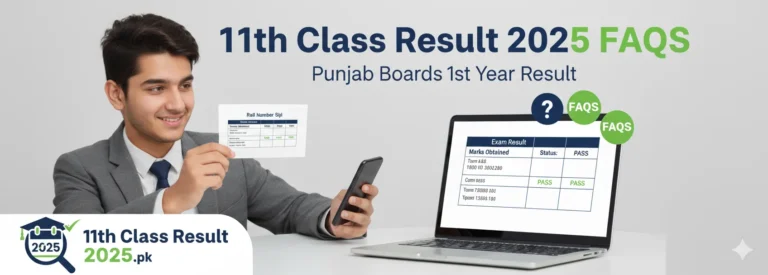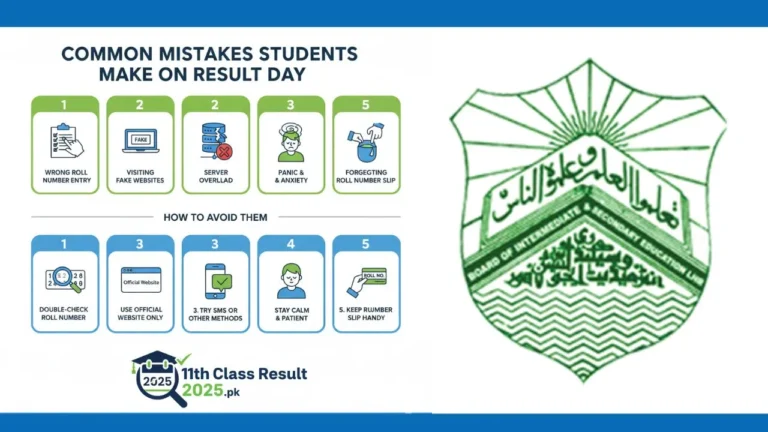Study Tips for 2nd Year – Score Higher in 2026
After the 11th class result 2025, every student steps into the final year of their intermediate journey. The 2nd year is not just another academic year – it is the deciding factor for your final percentage, university admission, scholarships, and future career choices. Students who learn from their first-year mistakes and adopt a smarter strategy in 12th class often achieve top marks.
In this guide, you will find practical study tips for 12th class students, the importance of 2nd year, daily routine suggestions, subject-wise focus areas, common mistakes to avoid, and answers to FAQs. By the end, you’ll have a complete roadmap to score higher in 2026 exams.
Why 2nd Year Matters More for Career & Exams
- Final Percentage: Your 1st and 2nd year marks combine to form the final intermediate result, but 2nd year holds greater weight due to practical exams and board scrutiny.
- University Admissions: Competitive programs (medical, engineering, business) mostly consider 12th class marks for merit calculation.
- Scholarships: Many local and international scholarships are awarded based on final year scores.
- Competitive Exams Prep: Entry tests like MDCAT, ECAT, and CSS foundation courses require strong conceptual understanding built in 2nd year.
This makes 12th class the make-or-break stage for most students.
Daily Routine Tips for 12th Class Students
Building a strong routine is the foundation of good results. Here’s a suggested daily plan:
- Morning Study: Revise tough subjects like Physics, Chemistry, or Math early in the morning.
- School/College Time: Pay full attention in class, note down important points.
- Afternoon Break: Take lunch and rest for at least 30–40 minutes.
- Evening Session: Solve numerical problems, past papers, or do group study.
- Night Revision: Revise short subjects like Urdu, Islamiat, and Pakistan Studies before sleeping.
- Weekly Practice: Dedicate weekends to past papers and MCQ practice.
Tip: Consistency matters more than long study hours. Studying 4–6 hours daily at home with proper focus is enough.
Subject Wise Focus Areas
English
- Practice essays, comprehension, and grammar daily.
- Prepare important applications and stories.
Physics
- Revise formulas and definitions regularly.
- Solve past paper numerical problems.
Chemistry
- Focus on reactions and equations.
- Learn MCQs from organic and inorganic chemistry.
Biology
- Practice diagrams and labeling.
- Revise definitions, short questions, and important long questions.
Mathematics
- Solve exercises step by step.
- Prepare formulas and theorems separately in a notebook.
Urdu, Islamiat, Pakistan Studies
- Revise important essays, nazams, and ghazals.
- Practice MCQs and short notes for quick learning.
Mistakes to Avoid in 2nd Year
- Ignoring 1st Year Weaknesses: Revise 11th class basics as they are part of the combined syllabus.
- Last-Minute Cramming: Don’t wait for exams – study daily.
- Skipping Practical Prep: Lab experiments in Physics, Chemistry, and Biology carry marks.
- No Past Paper Practice: Ignoring past papers is a big mistake; they show repeated patterns.
- Unbalanced Routine: Spending too much time on one subject and ignoring others.
FAQs for Students Entering 12th Class
Q1: How many hours should I study daily in 2nd year?
Studying 4–6 hours at home, along with full focus in class, is ideal for consistent preparation.
Q2: Is 2nd year more difficult than 1st year?
Yes, the syllabus is more detailed, but with daily study and proper notes, it becomes manageable.
Q3: Can I improve my 1st year marks in 2nd year?
Yes, through improvement exams offered by Punjab Boards, you can reappear in selected subjects.
Q4: Are past papers enough for 2nd year preparation?
They are very helpful, but you should also study textbooks, notes, and marking schemes.
Q5: When should I start entry test preparation (MDCAT, ECAT)?
Start alongside your 2nd year studies, especially MCQs practice in Physics, Chemistry, Biology, and Math.
Conclusion
The 2nd year is your golden chance to shape your academic career. If you stay consistent, revise daily, and avoid common mistakes, you can easily score higher in 2026 exams. Remember, smart work matters more than hard work.





